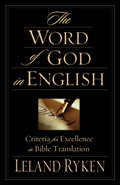
Leland Ryken
Reviewed by: G. I. Williamson
The Word of God in English: Criteria for Excellence in Bible Translation, by Leland Ryken. Published by Crossway Books, 2002. Paperback, 336 pages, list price $15.99. Reviewed by G. I. Williamson.
Let me begin this review by quoting a few words from an appendix that appears at the end of this book, written by C. John Collins. He writes: "My consistent response on reading Ryken's manuscript was, 'He's nailed it! He's put into words the things that have been brewing just below the surface of my consciousness.' " My own response, after reading this great book, is exactly the same.
Ryken argues for "an essentially literal translation" (p. 10), and in doing so he argues against the whole theory and practice of "dynamic equivalent translations." And he does so with such compelling and cumulative evidence that his argument is, I think, conclusive. After all, as he argues, the Bible actually is the inspired word of God. And that means that every word of it is God-breathed. I would not like what I've said to be represented by someone claiming to know "what I really meant to say," instead of what I actually did say. No, I would want them to know exactly what I did say, in my very own words - word for word. And the simple fact is that this is precisely what is prevented in dynamic equivalent translations. Instead, they present words that are different from those of the inspired author, under the claim that they represent what the author really intended to say.
As Ryken demonstrates, the Bible is not a book that can be simplified so that it is immediately clear to everyone, without great loss. The essentially literal translations (in the KJV tradition) sought to provide - as nearly as possible - a word-for-word translation. The result was that there were (rightly) many places in the Bible that seemed ambiguous in English, just as there are many places in the Bible that seem ambiguous in Greek or Hebrew.
In dynamic equivalent translations, the translators usually become interpreters, removing these ambiguities "to make things clear." They no doubt have good intentions, but in doing this they have actually kept readers from encountering what is actually there in the Bible as God himself inspired it. For example, one of the great losses (in dynamic equivalent versions) that I felt long before I read Ryken's book, is the absence of concordance (the ability to compare various passages because they use the same English word to represent the same Greek or Hebrew word). Since dynamic equivalence is not word based, this becomes impossible. And it is a very great loss, as Ryken shows. I highly recommend this book. It is my hope that it will convince many that there is scarcely any greater need in the church today than an essentially literal translation. I do not mean by this that there is nothing of value in these dynamic equivalent versions. But especially in the congregation of the Lord - where the Word of God is officially read and expounded - it is of the utmost importance that the version be as close as possible to the original. As our Confession says, "The Old Testament in Hebrew ... and the New Testament in Greek ... being immediately inspired by God ... are to be translated into the vulgar language of every nation unto which they come, that, the Word of God dwelling plentifully in all, they may worship him in an acceptable manner."
This can be done only by a translation that brings that original - "word for word," as much as possible - to God's people, so that they are confronted with what God says, and not with what someone says God "intended to say." What God intended to say, he did say. A version such as the English Standard Version - or the New King James Version - comes close to realizing this high goal.
This book is much needed. May it mark the beginning of the end for the ever-changing novelties of dynamic equivalency.
March 30, 2025
On the Trail with a Missionary
March 23, 2025
Midnight Mercies: Walking with God Through Depression in Motherhood
March 16, 2025
March 09, 2025
Zwingli the Pastor: A Life in Conflict
March 02, 2025
February 23, 2025
African Heroes: Discovering Our Christian Heritage
February 16, 2025
© 2025 The Orthodox Presbyterian Church